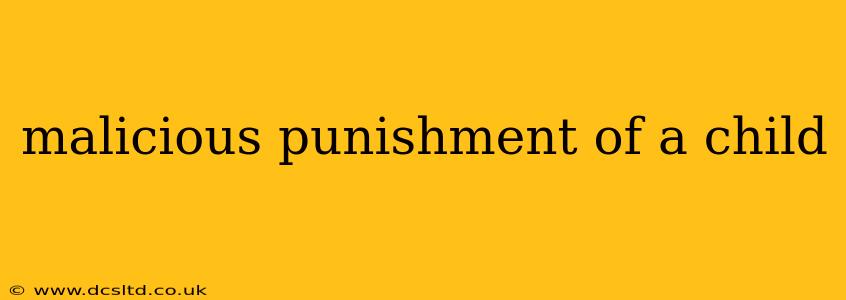The malicious punishment of a child is a serious issue with devastating consequences. It goes far beyond disciplinary measures and crosses the line into abuse, causing lasting emotional and physical harm. This article aims to shed light on what constitutes malicious punishment, its various forms, and the crucial steps to take if you suspect a child is being subjected to such treatment.
What Constitutes Malicious Punishment?
Malicious punishment differs significantly from disciplinary actions aimed at teaching children appropriate behavior. The key difference lies in the intent and severity of the action. While discipline should be corrective and proportionate to the child's actions, malicious punishment is driven by anger, frustration, or a desire to inflict pain and suffering. It's characterized by actions that are:
- Excessive: The punishment is far out of proportion to the child's transgression. A minor infraction shouldn't result in severe physical or emotional consequences.
- Cruel or Unusual: The methods used are inhumane and designed to cause unnecessary pain or distress. This includes actions that are degrading, humiliating, or intended to instill fear.
- Repeated and Patterned: The child experiences this type of punishment frequently, creating a climate of fear and intimidation.
- Intentionally Harmful: The adult inflicting the punishment intends to cause pain or suffering, rather than correct behavior.
Types of Malicious Punishment
Malicious punishment can manifest in various ways, including:
- Physical Abuse: This involves hitting, slapping, kicking, shaking, burning, or any other form of physical violence against a child.
- Emotional Abuse: This includes constant criticism, verbal attacks, threats, intimidation, humiliation, and isolation. It can also involve witnessing domestic violence.
- Neglect: While not directly a form of punishment, neglecting a child's basic needs – food, shelter, clothing, medical care, and emotional support – can be considered a form of malicious neglect, especially if it's intentional and intended as a form of control or punishment.
- Sexual Abuse: This encompasses any sexual act imposed on a child against their will. It is a particularly egregious form of malicious punishment, often leaving lasting psychological trauma.
How to Identify Malicious Punishment
Recognizing malicious punishment can be challenging, as it often occurs behind closed doors. However, there are certain signs to watch for:
- Unexplained Injuries: Bruises, burns, cuts, or other injuries that the child cannot explain or that are inconsistent with their explanation.
- Behavioral Changes: Sudden withdrawal, anxiety, aggression, fear of adults, bedwetting, or changes in school performance.
- Physical Neglect: Poor hygiene, inappropriate clothing for the weather, malnutrition, or lack of access to medical care.
- Fear of Specific Adults: A child showing consistent fear or avoidance of a particular adult in their life.
- Child's Direct Disclosure: In some cases, children may directly disclose that they are being punished cruelly.
What to Do if You Suspect Malicious Punishment
If you suspect a child is being subjected to malicious punishment, it is crucial to act swiftly and decisively. Here are the steps you should take:
- Report Your Concerns: Contact your local child protective services agency or law enforcement immediately. You can also report your concerns anonymously in many jurisdictions.
- Document Your Observations: Keep a detailed record of any instances you have witnessed or heard about, including dates, times, and specific details of the incidents.
- Seek Support: Talk to a trusted adult, therapist, or counselor for support and guidance on how to handle the situation.
- Protect the Child: If you believe the child is in immediate danger, call emergency services.
What are the long-term effects of malicious punishment on children?
The long-term effects of malicious punishment on children can be profound and devastating, leading to various mental health issues, including:
- Post-traumatic stress disorder (PTSD): The trauma experienced from severe punishment can lead to flashbacks, nightmares, and hypervigilance.
- Depression and anxiety: Constant fear and uncertainty can lead to chronic depression and anxiety disorders.
- Attachment disorders: Malicious punishment can hinder the development of secure attachments with caregivers, resulting in difficulties forming healthy relationships later in life.
- Substance abuse: Some individuals may turn to substance abuse as a coping mechanism for the trauma they experienced.
- Difficulty regulating emotions: Malicious punishment can disrupt emotional development, leading to difficulty managing anger, sadness, and other emotions.
It's imperative to remember that a child's well-being is paramount. Early intervention and appropriate support are crucial for healing and preventing lasting harm. If you suspect malicious punishment, don't hesitate to take action. Your intervention could make a life-altering difference.
